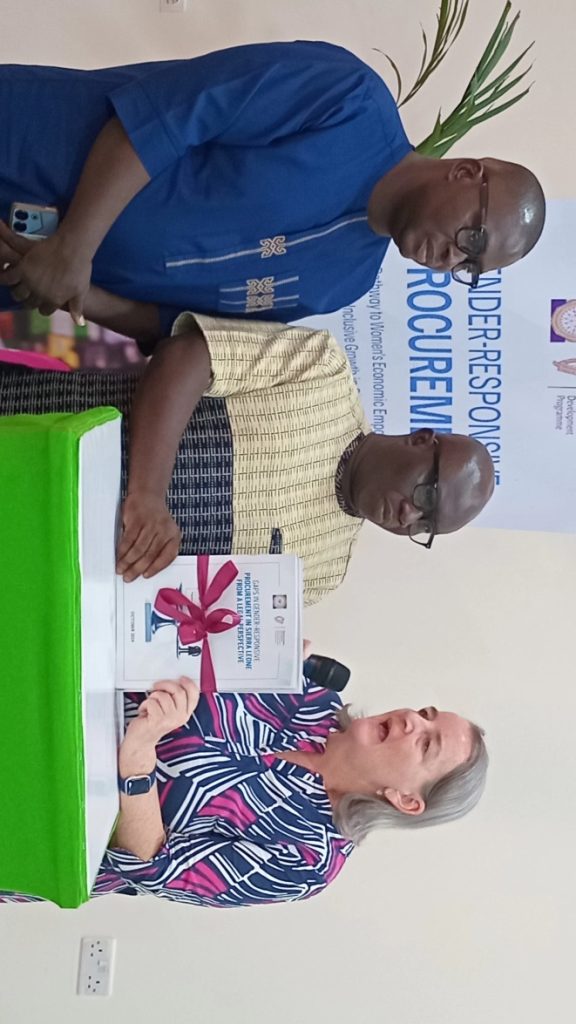By Hassan Gbassay Koroma

Budget Advocacy Network (BAN) on Tuesday launched three reports, all advocating for gender-responsive procurement.
The reports highlight gaps and challenges of women led businesses-from applying to securing contracts through the National Public Procurement Authority (NPPA).
Speaking at the launching ceremony held at the New Brookfield’s Hotel in Freetown, the National Coordinator of BAN, Abubakarr Kamara, said procurement alone takes above 45% of the national budget and that the government’s Medium-Term National Development Plan sets a target under Cluster 5 to empowering women, children, and persons with disabilities, to promote the overall empowerment of women in the political, social, economic, and cultural spheres.
He said the sustainable Development Goal 5, which has to do with gender equality, targets reforms to give women equal rights to economic resources, among other things.
The reports analyze the legal framework of public procurement from the gender perspective.
The overarching objective was to review the current legal framework guiding public procurement with a view of identifying the gaps and challenges limiting gender-responsive procurement in the country.
It further proffer evidence-based recommendations that will inform legislative and policy reforms that align with sub-regional, regional, and global procurement standards in relation to gender-responsive procurement.
According to Kamara, based on the objectives of the reports, including the analysis of procurement activities (2021-2023), they selected procurement activities conducted by MDAs within the period 2021 to 2023 Financial Year, to ascertain the number of women-led businesses that benefited from such procurement and to understand the pattern, type, and methods of procurement undertaken by women-led businesses within the period under review.
He said the studies mapped out barriers affecting women’s participation in public procurement, adding that the purpose of the research was to deepen the understanding of the characteristics of women-led businesses and practices that either promote or hinder their participation in public procurement.
He presented that the studies identified women businesses in relation to their location, nature of business, capacity, legal status, access to capital, networking, and access to tender.
He disclosed that the reports made recommendations to improve the participation of women-led businesses in public procurement processes.
Presenting from the legal point of view, Executive Director, Centre for Accountability and Rule of Law Sierra Leone (CARL-SL), Ibrahim Tommy, presented that, the key objectives of the studies were to identify gaps in the legal framework that undermine a gender- responsive public procurement environment in the country and also identify international best practices that enable gender-responsive procurement best practical recommendations for adoption in Sierra Leone.
He said the studies were also about identifying opportunities and missed opportunities in the current procurement laws and regulations that could enhance gender responsive procurement in Sierra Leone, identify and assessing provisions in procurement policies and laws aimed at enhancing gender-responsive procurement.
He further noted that some of the key findings of procurement governance reveal that the primary objectives of Sierra Leone’s public procurement is to ensure value for money and enhances the effective management of public resources.
He said while the National Public Procurement Act mandates are align with government policies of promoting the appointment and full participation of women in procurement, there is little evidence that deliberate standards and practices have been established to ensure the operationalization of those clauses.
He said the key considerations that inform the laws and practice of procurement in Sierra Leone do not accentuate the need for a gender-responsive procurement ecosystem; instead they focus on ensuring value for money, minimizing wastage and fraud, promoting transparency and accountability, compliance with procurement regulations and policies, and guaranteeing quality and fairness.
He pointed out that there are no more than two provisions of the law that either recognize the need for women’s participation in procurement governance or directly require the presence of women in a procurement body.
He said there are multiple provisions that would have provided an opportunity to include women in procurement governance at various levels if amendments are made to the current provisions.
He cited that Section 4(1) of the NPPA Act provides for 25% women’s participation in the board of the NPPA, which is inconsistent with the provision of a minimum 30% quota in the GEWE Act of 2022.
Tommy said the Act provides that the governing body of the NPPA shall be a Board consisting of 8 persons, and two of the members must be women, and that Section 11(c) of the same Act also provides an opportunity for any proactive leadership with an unbridled commitment to enhancing women’s inclusion in procurement governance to utilize it for such outcomes.
Proffering recommendations, Tommy stated that given the highlights, there is a clear need for the government to review the procurement laws, policies, and regulations, to make provisions for increased women’s participation in public procurement, which among others, include the provision for a quota system for goods and services procurements, margin of preference, and the mandatory pre-bid sessions.
He further recommended that the Ministry of Gender and Children’s Affairs, civil society, and the media should increase monitoring of gender-responsive actions within the procurement landscape.
Carol Hannon, Head of Development at the Embassy of Ireland said to ensure women’s development and empowerment in the country is at the heart of the Embassy and that was why they funded BAN to enbark on such research.
She said women are faced with lots of challenges, including sexual exploitation when trying to secure government contracts through procurement.
Also speaking during a panel discussion, Chief Executive Officer, National Public Procurement Authority, Fodie Kanneh, noted that the reports were timely and disclosed that in 2025, they would review the NPPA Act.
He promised that they would ensure that the recommendations of the reports are captured during the review process.


